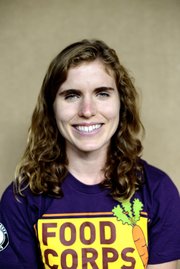Friday, March 28, 2014
JACKSON — For the last year, Mariel Parman, 24, has worked as a service member with Food Corps to help improve the health of Mississippi's young people by linking health disparity with social change.
The nationwide team of leaders, whose common mission is to promote and improve health and wellness, want to ensure a healthy food environment within Jackson area schools. Mississippi Roadmap to Health Equity serves as Mississippi’s host Food Corps organization.
Parman, who grew up in Jackson, and the rest of the Jackson Food Corps team are teaching Jackson students about healthier food options, building and tending school gardens, and bringing high-quality food into school cafeterias.
An application process selects new members; the deadline for the 2014-15-service term is Sunday, March 30. Those selected to become service members work for an entire year in Mississippi or one of the other 14 states with Food Corps service sites. Food Corps supplies its members with a $17,500 living allowance, a $5,645 AmeriCorps Segal Education Award, student-loan forbearance, health insurance and even partial child-care reimbursements.
Parman is one of the five other Mississippians on the 10-person team. She has worked with Brown Elementary and Rowan Middle School, taking students into gardens and teaching them the nutritional value of various fruits and vegetables.
“I had the most fun teaching the students at Brown and Rowan about food preservation,” Parman said. “We made pickles to demonstrate one way of preserving food and it was such a hit with the students. Many of them had no idea pickles that they normally eat are actually cucumbers and that they can pickle so many types of foods.”
Before working with Food Corps, Parmen spent a year in Washington, D.C., working with AmeriCorps, which she says encouraged her to want to come back and work with Food Corps in her home state.
“It put things in perspective being out there (Washington) … realizing how much poverty there really is,” Parman said. “You can see that in our state, and you can know that but if you don’t get out and really experience it in a different community you can become blind or used to it. It was time for me to be back serving in my own community.”
While it is true that Mississippi is known for unhealthy lifestyles, Parman says that many people and groups are taking action, now more than ever, to promote better health among the state's residents. Since September 2013, Food Corps has reached more than 74,000 children, planted 190 gardens, and has encouraged more than 2,400 community members to volunteer nationwide.
“I feel that there is more talk about trying to make change,” Parman said. “As far as the schools, things have gotten better. The lunches—yes, I would still like to improve them, but at least through these federal mandates schools are making changes.”
One of the challenges Parman and the other service members face is a drawback that comes with having federally mandated food in schools. Parman explained that some children are actually throwing away the healthier options they receive out of a personal dislike of fruits and vegetables. Food Corps is trying to combat this issue by educating the youngest of kids about the benefits of homegrown food. The earlier children are exposed to healthier food, the more likely they will continue to incorporate healthier options in their diet, Parman says.
“We’re trying to get kids connected to fruits and vegetables and see how they are grown in the garden,” Parman said. “This way they can have a better understanding of what these plants are, and having them taste and try them at a very young age is critical to getting children to eat this food.”
Parman also says that she and her service members must always being conscious of their approach when dealing with students who are unmotivated to eat healthier options.
“When you’re dealing with young kids—it’s so different than when you’re dealing with adults,” Parman explained.
She said even the tone matters when giving them health advice. "A lot of us (Jackson service members) are white females. We come from a lot of privilege so I think we have to be very aware of how we come in and be sensitive to the fact that we are introducing a lot of new foods that some of these kids have never seen. At the same time, we try to be practical by showing them foods that their parents can actually find and afford to buy.”
Parman’s service term will be over at the end of July but says she plans to continue her efforts in public health by attending graduate school at the University of Alabama to obtain her master’s degree in public health.
“I want to concentrate on health behavior,” Parman said. “I want to work around obesity prevention and crime disease prevention, especially along the community level.”
For more information on Food Corps or to apply for service membership visit the official website at https://foodcorps.org/.

